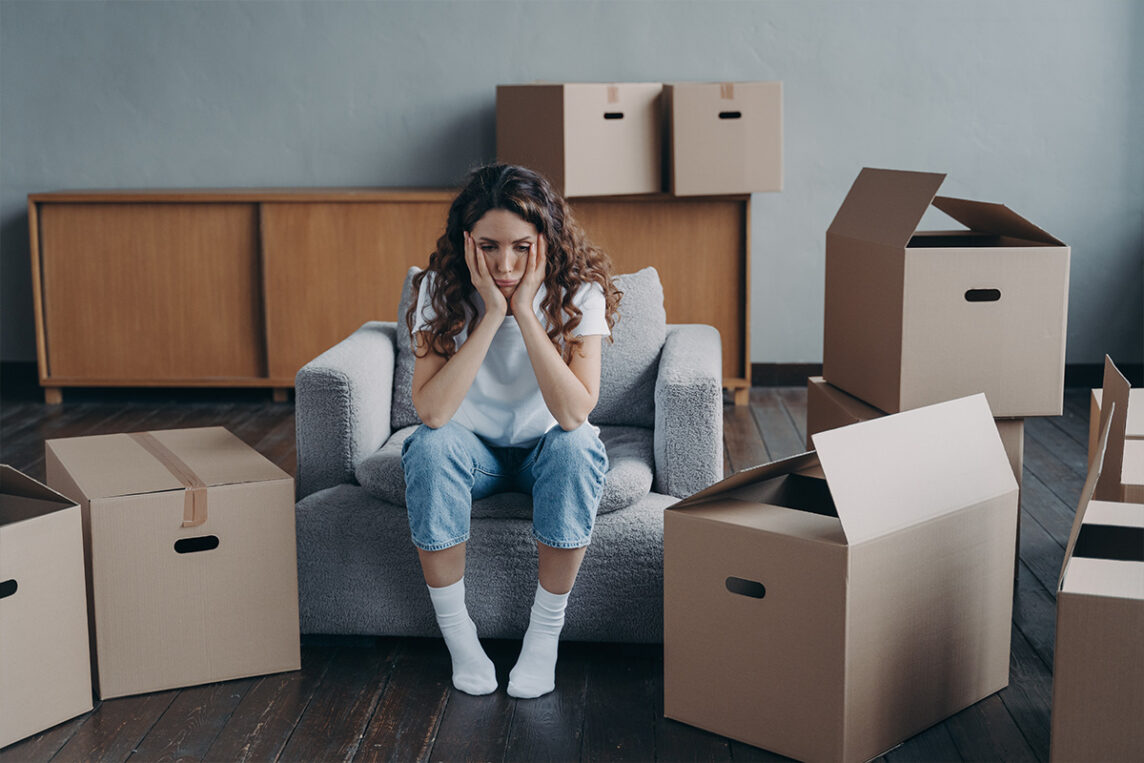Moving to a new home can be exciting and bring about positive change, but the process of relocating is often riddled with fear and anxiety.
Many people experience a wide range of emotions when faced with the prospect of moving their home, from the fear of failure to anxiety about leaving behind their current social connections and familiar surroundings. The intensity of these feelings can be overwhelming and may lead to:
- Anxiety disorders
- Depression
- Panic attacks
As a result, it is important to understand the reasons people fear moving and explore coping strategies that help to ease their anxiety and make the process more manageable.
Causes of Moving Fear
Moving to a new home can be a stressful and emotional experience for many individuals. Among the many different challenges posed by the moving process, one of the primary issues that people face is a fear of change.
Relocating to a new place often means leaving behind everything familiar and stepping into the unknown. This can be an intimidating experience for even the most resilient of individuals.
Whether you are moving across the street or to a new country, understanding and addressing these root causes of moving fear can help make the transition as smooth and stress-free as possible.
Financial Concerns
Moving can be an expensive undertaking, and many worry about the expenses that come with it. Creating a moving budget and finding affordable and reliable movers can help reduce these financial fears.
To start with, it’s crucial to create a moving budget and keep track of all the costs involved in the move, including:
- Moving supplies
- Transportation
- Other expenses
Finding affordable and reliable movers can also help keep costs under control. It’s important to research and compare different moving companies to find the most affordable and reliable one.
To minimize costs, it is advisable to steer clear of peak moving periods such as weekends and holidays, which may result in increased prices.
Paring down possessions and packing belongings yourself can also save money on moving costs. Sort through belongings and decide what to keep and sell before packing to avoid unnecessary expenses.
Uncertainty
Moving to a new home can be an exciting adventure, but it also comes with its fair share of uncertainties. Whether you’re relocating for a new job, moving to be closer to family, or simply seeking a change of scenery, the process of packing up your life and starting anew can be overwhelming. Uncertainties may include the following:
- Adapting to a different lifestyle
- Adjusting to the new environment
- Finding new professional networks
- Making new friends
The first step in coping with uncertainties is to identify them before the move. Recognize potential sources of stress to plan how to address them. [1]
If the move involves a new job, creating a plan to adjust and establish new routines can reduce anxiety and stress.
Another way to cope with the uncertainties of a new home is to focus on the opportunities and advantages of the move.
The ability to explore a new area, meet new people, and experience a different lifestyle can be exciting and enriching. Visualizing the positive aspects of the move can help shift the focus from the unknown to the possibilities.
Seeking support from mental health professionals may be helpful. Behavior therapy, systematic desensitization, breathing exercises, and educational programs can provide effective coping strategies to help adjust to a new environment and reduce anxiety and stress levels.
You’re not alone in these feelings surrounding change. In fact, neuroscience has shown that uncertainty feels similar to failure in our brains. That’s why so many people would rather avoid change because of how uncomfortable the associated feelings can be.

Change in Routine
Establishing new routines can be an effective way to cope with the challenges and uncertainties of moving to a new home. While change can be intimidating, it’s also an opportunity to reevaluate daily habits, prioritize self-care, and potentially find more fulfilling ways to spend time.
As individuals begin to settle into their new living space, it’s important to start developing new routines that are tailored to their needs and preferences. This process can feel overwhelming at first, but setting small, achievable goals can help make the transition smoother and less daunting.
Committing to a daily exercise routine or setting aside time for a new hobby can provide a sense of structure and purpose as individuals adjust to their new surroundings.
Reaching out to local community organizations, joining a gym, or taking classes can be a great way to meet new people and establish a sense of belonging in a new city or town.
Even simple acts, such as exploring the neighborhood, trying out new restaurants, or creating a new morning routine can help establish a sense of familiarity and comfort in a new home.
By prioritizing self-care, staying open to new experiences, and setting achievable goals, individuals can navigate the uncertainties of moving and ultimately thrive in their new environment.
Anxiety about the New Place
Moving to a new home can be an exciting adventure, but it can also trigger anxiety and stress. The thought of leaving behind familiar surroundings and starting over in an entirely new place can create apprehension and uncertainty.
One of the significant anxieties that come with moving to a new place is the adjustment phase. This includes:
- Adapting to the new environment
- Finding new places to shop or eat
- Getting used to new surroundings
- Learning the local customs
People may struggle with feelings of loneliness and isolation when they move to a new location. Making new social connections takes effort and time, and it’s easy to feel out of place in a new community. The fear of not fitting in with the community can also be a source of anxiety, leading to self-doubt and worry.
All of these anxieties can make the idea of moving to a new place feel overwhelming. Taking the time to explore the new environment and gradually adjust to the changes can make the transition smoother.
Fears About Leaving Friends and Family Behind
Leaving loved ones behind when moving to a new home can trigger a variety of fears and anxieties. People may worry about losing close relationships and missing out on significant life events.
The thought of not being there to support family or friends in times of need can also cause feelings of guilt and helplessness. Individuals may fear that distance will cause their relationships to fade or drift apart.
These concerns are entirely valid and can have a significant impact on a person’s emotional and mental health. The fear of missing out or not being there for friends and family can lead to feelings of loneliness, sadness, and depression.
It can also cause individuals to struggle with adjusting to a new community or environment, making it harder to establish new social connections.
It can be helpful to acknowledge these fears and take steps to address them, such as making an effort to stay in touch with loved ones through frequent video chats or phone calls.
Engaging in activities that promote mental health, such as breathing exercises or education programs about coping with life changes, can also be helpful.
By recognizing the validity of these fears and finding ways to manage them, people can make the transition to a new home more comfortable and positive.

Signs and Symptoms of Moving Fear
Many people experience moving fear, which is a sense of anxiety or unease associated with the process of moving. This fear can manifest in different ways, including physical and emotional symptoms.
By understanding the signs and symptoms, you can better prepare yourself for the moving experience and learn effective coping strategies to overcome them.
Physical Symptoms
Moving to a new home can elicit a range of emotions, including fear and anxiety, which can manifest in physical symptoms.
These symptoms can include
- Digestive issues
- Headaches
- Increased heart rate
- Muscle tension
- Shortness of breath
- Sweating
For some individuals, the fear and anxiety can be so severe that it can interfere with their daily life and activities. It’s important to recognize the physical symptoms of fear and anxiety related to moving so that they can be addressed and managed.
Techniques such as deep breathing, meditation, or exercise can help alleviate stress and promote relaxation. Seeking support from loved ones or a mental health professional can be beneficial in managing anxiety and fear associated with moving.
Taking small steps towards the move, such as decluttering or packing, can help reduce the sense of overwhelm and provide a sense of control over the process. By acknowledging and addressing the physical symptoms of fear and anxiety, individuals can alleviate the negative impact that it can have on their well-being and successfully navigate the transition to a new home.
Emotional Symptoms
Relocation depression is a type of situational depression that occurs after relocating or moving. This type of depression is not listed in the DSM-V but may demonstrate symptoms similar to those associated with clinical depression on a short-term basis. [2]
Relocating to a new home can bring forth a range of cognitive symptoms that can negatively impact a person’s daily life and relationships.
For starters, individuals may experience:
- Anticipation
- Anxiety
- Excitement
- Fear
- Homesickness
- Loneliness
- Nostalgia
- Sadness
- Stress
- Uncertainty
These symptoms can lead to a sense of disconnection from one’s surroundings, with individuals fearing they may lose the life they currently know.
Moving can also result in symptoms that are similar to those of clinical depression, as individuals may feel as though they are losing control over their lives.
They may experience intense feelings of sadness, hopelessness, and even thoughts of death or dying.
Such feelings can significantly affect one’s quality of life, as they can lead to a lack of motivation, reduced interest in daily activities, and a negative impact on social connections.
In some individuals, the impact of moving can lead to chronic fear and relocation depression. It’s important to remember that seeking the help of a mental health professional or behavior therapist can be highly beneficial.

If you’re feeling overwhelmed about your upcoming move, consider reaching out to RJ Movers. With their experienced team of movers and commitment to delivering a low-stress move, they can help alleviate some of the uncertainty and anxiety that comes with relocation.
From packing up your belongings to unpacking at your new home, RJ Movers provides comprehensive moving services to ensure a seamless transition. Take the first step towards a stress-free move and contact RJ Movers today.
References
[1] Mautz, S. (2021, January 5). Science Says This Is Why You Fear Change (and What to Do About It). Inc.com. https://www.inc.com/scott-mautz/science-says-this-is-why-you-fear-change-and-what-to-do-about-it.html
[2] Robinson, K. M. (2021, July 12). What Is Situational Depression? WebMD. https://www.webmd.com/depression/situational-depression








